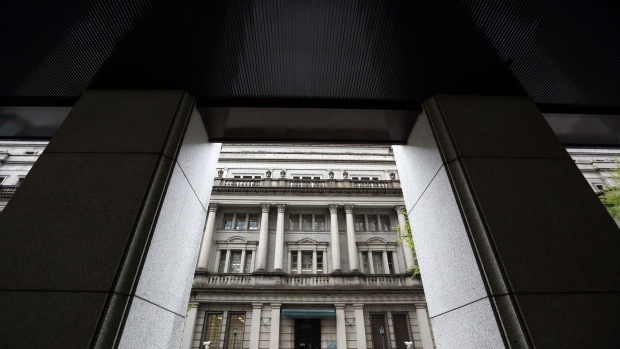Jun 9, 2023
BOJ Is Said to See Little Need to Tweak Yield Curve Control Now
, Bloomberg News

(Bloomberg) -- Bank of Japan officials see little need to adjust its yield curve control program at a policy meeting next week given improvement in the functioning of the bond market and the smooth shape of the yield curve, according to people familiar with the matter.
The officials also recognize that inflation is running stronger than they expected, a factor that raises the chance of the BOJ upgrading its inflation forecast in a quarterly economic outlook report in July, according to the people.
Still, officials aren’t confident enough to say achievement of the BOJ’s 2% price target is in sight, pointing to the need for continued monetary stimulus, the people said.
The yen fell and bonds rose after the report. The yield on 10-year Japanese government bonds fell 1 basis point, while bond futures ticked higher.
Governor Kazuo Ueda and his fellow board members will conclude a two-day policy meeting on June 16. Speaking in parliament Friday, Ueda said that recent data appear to show inflation deviating upward from the BOJ’s base case.
Read More: Why BOJ’s Small Tweak to Bond Yields Was a Bombshell: QuickTake
The final policy decision next week will be made after assessing economic data and developments in financial markets up until the last moment, the people said.
As the last anchor of global low interest rates, whether the BOJ will decide to pivot away from easing is a key factor that could cause ripples across global financial markets.
T. Rowe Price, BlackRock Inc. and the European Central Bank are among those warning that any policy normalization from the BOJ may send a wave of Japanese cash flowing out of global markets and surging back home.
Read More: T. Rowe Sees BOJ Shift as ‘San Andreas Fault’ of Global Finance
Almost all BOJ watchers expect no major policy shift next week, according to the latest Bloomberg survey. Taking over from June, July has now become the most popular month for policy change among economists, with 35% expecting it to happen next month.
Japan’s deeper inflation trend continues to strengthen. A measure of consumer prices excluding fresh food and energy hit its highest level since 1981 in April. More than half of surveyed economists see a rising chance that the central bank will achieve its 2% price target, the most on record in Bloomberg polls.
Since taking the helm in April, Ueda has sent dovish signals by citing “extremely” high costs of premature tightening after green shoots are finally appearing for sustainable inflation.
“There is still a little distance to attaining the 2% price target in a stable and sustainable manner,” Ueda said in parliament Friday. “Therefore, our stance is to continue with monetary easing patiently.”
--With assistance from Cormac Mullen.
(Updates prices. An earlier version of this story corrected the size of the bond move in the fourth paragraph.)
©2023 Bloomberg L.P.






